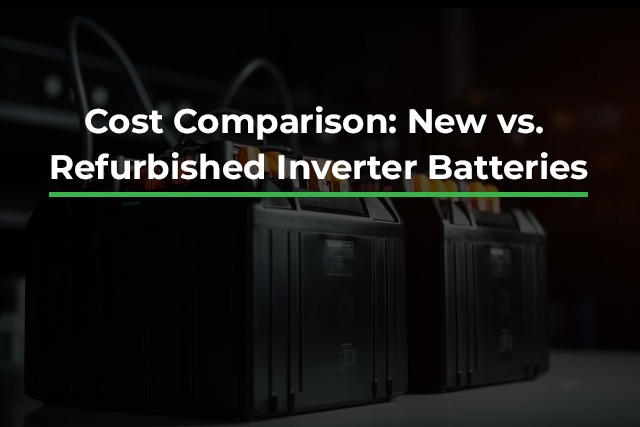- info@restorelife.io

The rise in demand for better, more efficient, and cost-effective inverter batteries has increased in the past two decades, with individuals thoroughly comparing products with a detailed view to cut the cost of additional expenses imposed on them and to buy the best product within budget. One such cost comparison is between the new and refurbished battery.
Moving forward in the article, the detailed analysis of cost comparison between new, and refurbished inverter batteries will be highlighted.
Analysis of new Inverter Batteries:
1. Upfront Investment: Most of the new inverter batteries come at higher upfront costs. The cost of installation, brand fee, etc takes a toll on the pockets of an individual.
2. Warranty: New inverter batteries have a manufacturer’s warranty plus an extended warranty of up to 5 years that provides assurance and brand reliability.
3. Lifespan: Proper maintenance may get a new inverter battery to serve from 5 to 10 years, subject to usage patterns and environmental factors.
4. Performance: A new battery ensures maximum capacity and efficiency from the first day itself since new batteries offer peak performance.
5. Long-term Value: Although the upfront investment could be more, it generally turns out better in terms of value due to its longer lifespan and consistent performance.
Analysis of Renewed Inverter Batteries:
1. Upfront Cost: Refurbished batteries are generally priced 30% to 50% lower than a new battery.
2. Warranty: Refurbished batteries usually have a longer warranty, typically from 6 months to 2 years. Some vendors may offer extended warranties for a higher price.
3. Life expectancy : The total life expectancy of the refurbished battery is always shorter than that of a new one. This could be from 2-5 years depending on the quality of the refurbishing and the subsequent usage.
4. Performance: While good-quality refurbished batteries can perform very well, peak capacity and efficiency will be off the highest values from new batteries. Moreover, performance can also be more variable across different units.
5. Long-term Value: A lower upfront cost may be enticing, but a shorter lifespan and lower performance could lead to a requirement for more frequent replacements.
Detailed analysis of cost comparison between Refurbished vs. New Battery:
1. Performance Differences: If the refurbished battery delivers only 80% of the performance compared to a new one, it may be a better and cheaper alternative for investment.
2. Maintenance Costs: Refurbished batteries are more likely to entail higher maintenance frequencies and costs.
3. Energy Efficiency:New batteries may be more energy efficient and thus save on electricity bills in the long run.
4. Disposal Costs: More frequent replacements with refurbished batteries may mean that the costs of disposal are likely to be lower, and this must be factored into the overall cost.
5. Opportunity Cost: The time and effort involved in more frequent replacements with refurbished batteries are an additional cost.
6. Reliability Factor: The chances of sudden failure are usually higher with reconditioned batteries, and this may entail additional costs or hassle costs that cannot be factored into a simple price comparison.
Conclusion:
Cost-effectiveness will depend on several factors, including your usage patterns, local market prices, and individual priorities. Though refurbished inverter batteries have lower up-front costs and may represent a better economic value for short-term operations, a new battery generally provides better long-term reliability and stable performance.
Sometimes, peace of mind or even long-term savings that a new battery can give may outweigh the short-term cost savings of a refurbished one. On the other hand, a good refurbished battery could turn out to be a very cost-effective solution when there is a need for only short-term applications or when the budget is an issue. At Restore we provide refurbished batteries at a nominal price that are very effective in supplying optimal power throughout the day.